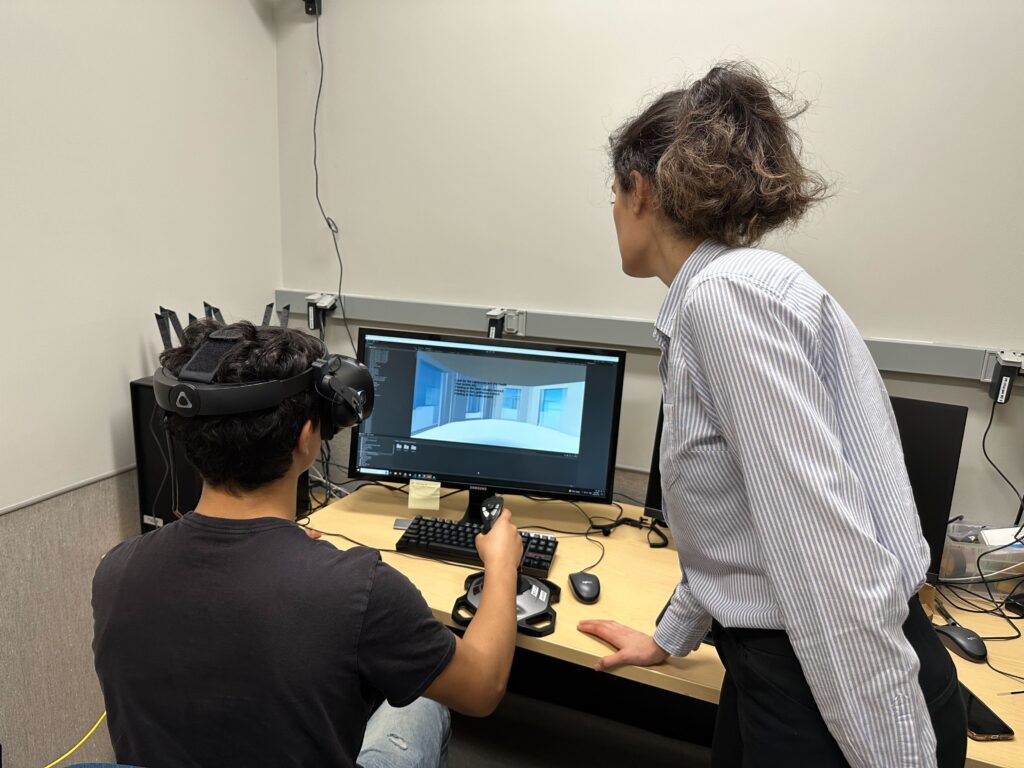Do you have a bad sense of direction or get lost easily? These navigational deficits could be an early sign of cognitive decline. In particular, Alzheimer disease affects certain parts of the brain which are responsible for memory, navigation and spatial awareness.
DMCBH members Dr. Manu Madhav and Dr. Thalia Field are working together to develop and test a behavioural biomarker for Alzheimer disease by creating a task designed to assess navigational ability. Both human participants and rodents will take part in navigating paths in a maze that will become increasingly complex. Researchers will determine the complexity at which a participant’s navigation capabilities become impaired. Comparing this threshold between healthy older participants and those with diagnosed preclinical Alzheimer disease may reveal the threshold at which brain dysfunction is evident.
In this project, Dr. Madhav highlighted the importance of effective communication between clinicians and scientists, allowing research to transcend disciplinary boundaries.
“This collaboration has been instrumental in refining our ideas and tasks to align with real-world clinical needs, giving us invaluable insights into the varied presentations of Alzheimer disease,” notes Dr. Madhav, on working with clinicians from the Clinic for Alzheimer Disease and Related Disorders (CARD). “We have learned that factors such as anxiety, fatigue and physical discomfort can greatly impact participants’ ability to complete tasks. So, after initially considering robotic teleoperation, we decided to create a purely virtual reality version of the task.”
In the task, human participants will navigate through a maze with a virtual reality (VR) headset and joystick, similar to playing a video game. Based on feedback from CARD clinicians, several modifications are being made, such as obtaining lighter headsets and having the option to complete the task remotely, such as at home or clinic. The maze has also been redesigned and disguised as a hotel corridor, to make it more interesting and aesthetically pleasing for participants.

Amr Sadek (undergraduate research assistant) and Afsoon Gharib Mombeini (PhD student) try out the virtual reality task in Dr. Madhav’s lab.
On the rodent side of things, a physical maze is being built by members of Dr. Madhav’s lab. This maze has 228 independently movable wall segments that can be reconfigured in real-time to generate an infinite number of unique paths of increasing complexity. Postdoctoral fellow Adam Lester is working on various prototypes of the maze and the aim is to have it fully functional by the fall so that experiments with rodents can begin.
“Several brain regions, including the entorhinal cortex, hippocampus and frontal cortex, are involved in spatial navigation and memory,” says Dr. Madhav. “To understand why navigation problems occur, we will examine electrophysiological recordings, which allow for the measurement of the electrical activity in the brains of the rodents, identify the point at which the neural circuit function breaks down, and correlate it with behavioural changes in the maze task to see if mistakes become more prevalent.”
By studying both young and older rodents, the research team hopes to recreate a model of the normal, canonical progression of Alzheimer disease that is observed in humans, in order to gain insights into the stages of navigational deficits underlying the disease. Analysis of both the behavioural and electrophysiological data using machine learning tools will be done in collaboration with Dr. Khanh Dao Duc in UBC’s Department of Mathematics and Dr. Nina Miolane from the University of California Santa Barbara’s Department of Electrical and Computer Engineering.
“I am not only a basic neuroscientist but an engineer, so in addition to changes in behaviour, I want to also understand the mechanisms – why are these deficits occurring in a computational sense?” explains Dr. Madhav. “Our hypothesis is that as tasks become more complex, the connections between neurons would also need to be more complex. As Alzheimer disease progresses and connections between neurons break down, it impairs the brain’s ability to construct complex representations of our surroundings.”
Dr. Madhav and his lab members Isaac Morgan and Afsoon Gharib Mombeini recently provided a demo of the VR task at the Vancouver Coastal Health Research Institute’s 20th anniversary Innovation and Industry Showcase in May. The plan is to recruit human participants, starting this summer.
By comparing the neural and behavioural data from animal models to human behavioural data, Dr. Madhav and his team hope to be able to develop a diagnostic tool that can detect navigation impairments and understand underlying brain mechanisms associated with early-stage Alzheimer disease. This knowledge will lead to better treatments and support for people with dementia and help to prolong brain health.
To participate in this research project, please contact: Isaac Morgan (isaac.morgan@ubc.ca)


